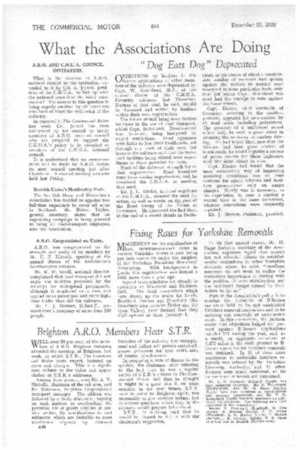What the Associations Are Doing
Page 44

If you've noticed an error in this article please click here to report it so we can fix it.
"Dog Eats Dog" Deprecated
OBJECTIONS by hauliers to the licence applications of other members of the industry were deprecated by Capt. W. Strickland, M.P., at the annual dinner of the C.M.U.A. Coventry sub-area, last Thursday. Matters of that kind, he said, should be discussed and settled: by hauliers within their own organization.
The future should bring even further increases in the use of road transport, added Capt. Strickland. Development was, however, being hampered by stupid restrictions. Road operators were liable to lose their livelihoods, not through any fault of their own, but because the railways said that the transport facilities being offered were superfluous to those provided by them.
Much of the railways' strength lay in their organization. Road transport must have similar organization, and he visualized the C.M.U.A. as meeting that need.
Mr. J. L. Kinder, national organizer of the C.M.U.A., stressed the need for action, as well as words, on the part of the Road Group of the House of Commons. He instanced the fact that, at the end of a recent debate in Parlia ment, in the course of which a considerable number of members had. spoken against the motion to restrict road transport in some particular form, only four (of whom Capt. Strickland was one) had the courage to vote against the Government.
Capt. Hector, chief constable of Coventry, referring to the accident problem, appealed for co-operation by all road users, including pedestrians. The presence of a uniformed patrol officer had, he said, a great effect in reducing the tendency to careless driving. He had hoped that, now that the Minister had been given control of trunk roads, he would organize a system of police patrols for those highways, with the same object in view.
Capt. Hector had found that the most satisfactory way of improving motoring conditions was to issue cautions for minor offences and institute prosecutions only on major charges. Rarely was it necessary, in his experience, to issue a caution a second time to the same individual, whereas convictions were frequently repeated.
Mr. J. Morton, chairman, presided.












































































